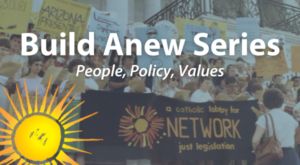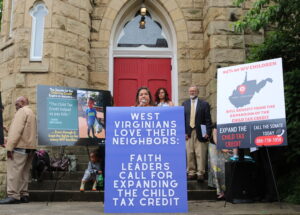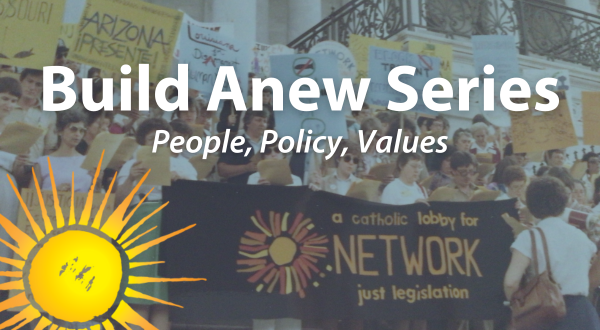
Build Anew Series — Part 5
Tax Justice
Virginia Schilder
October 20, 2023
Welcome back to our Build Anew Series, with weekly posts covering the people, policies, and values at the heart of the issues we work on. This week, we’re talking about tax justice, and specifically, the need to bring back the expanded Child Tax Credit.
- Part 1 – Introduction
- Part 2 – Immigration
- Part 3 – Economic Justice
- Part 4 – Food Justice
- Part 5 – Tax Justice (below)
- Part 6 – Democracy
 It’s budget time in Congress, and many of our representatives are pretending that we have a scarcity of funds with which to fund our government. But that’s patently untrue. There is a simple reality: If the wealthiest Americans and corporations paid their fair share of taxes, we would have more than enough to pay for all the public programs our communities not only need, but deserve. To visualize this, I invite you to try out NETWORK’s tax justice calculator tool, in which you can build your own federal budget with programs you care about and see how equitable tax policies can fund them. The United States has one of the greatest — and
It’s budget time in Congress, and many of our representatives are pretending that we have a scarcity of funds with which to fund our government. But that’s patently untrue. There is a simple reality: If the wealthiest Americans and corporations paid their fair share of taxes, we would have more than enough to pay for all the public programs our communities not only need, but deserve. To visualize this, I invite you to try out NETWORK’s tax justice calculator tool, in which you can build your own federal budget with programs you care about and see how equitable tax policies can fund them. The United States has one of the greatest — and
most dangerous — degrees of wealth inequality in the world. The concentration of wealth into the hands of an ultra-wealthy few is facilitated and maintained, in large part, by our tax system. For example, consider Jeff Bezos, Amazon’s Founder and Executive Chairman, who enjoys a net worth of $155 billion, but did not pay a single cent in federal income taxes in 2007 or 2011.
A just tax system is a foundation of a just society, and a multi-faith, multi. In our past Build Anew Series piece on Economic Justice, we talked about how we as a collective have enough resources to ensure that everyone has what they need to thrive — it is only a matter of distributing those resources justly. Taxes can help us do that.
Congress now has less than 30 days to pass a FY24 federal budget. As part of NETWORK’s Congress, Keep Your Promise! Campaign, we’ve been urging our leaders to ensure that vital human needs programs like food, housing, and health care assistance are fully funded in the budget, and that the necessary policies are enacted to ensure that the wealthiest individuals and corporations contribute their fair shares.
A central part of a just tax system in the current budget process is the expanded Child Tax Credit (CTC). An expanded CTC combats child poverty, supporting families as they provide necessary care and resources for their children. The expired, temporary expanded CTC in 2021 (the American Rescue Plan increased the child tax credit for one year) was a resounding success. The child poverty rate was dramatically reduced to a record low 5.2%. It kept roughly 2.1 million children above the poverty line ― including an estimated 752,000 Latino children, 649,000 white children, 524,000 Black children, 89,000 American Indian and Alaska Native children, and 56,000 Asian children ― and lessened differences in poverty rates between children of all races and ethnicities (Center on Budget and Policy Priorities). Our children need it back!
In this week’s installment of the Build Anew Series, we’ll learn more about the CTC and the urgency of strengthening it in the ongoing appropriations process. First, let’s learn more about tax policy in the U.S., and why a just tax system is critical for a ju st nation.
Facts and Figures on Taxes in the U.S.
- Refundable tax credits moved 7.5 million people out of poverty in 2019, according to the Supplemental Poverty Measure.
- A 2019 Congressional Research Service report calculated that the 2017 Tax Revision law reduced federal revenue by about $170 billion in FY 2018, with corporations benefiting most from the tax cuts.
- According to the U.S. Treasury Department, the wealthiest 1% of Americans may be evading as much as $163 billion in income taxes each year — many doing so legally via our unjust tax laws.
Present Realities
Our unjust tax code is directly related to the economic instability experienced by individuals and families across the U.S., and it affects the wellbeing of our country overall. Taxes enable us to have the public services we all want and benefit from, and to make the investments in people and neighborhoods that are needed for our communities to thrive. If we want good schools and accessible higher education, safe and efficient transportation infrastructure, a strong health care system, and healthy communities with affordable housing, clean water, and food security, we need to collectively contribute to funding them.
Decades of tax cuts for the wealthiest people and corporations have harmed our communities. Our tax code actively creates economic inequality — one of the most pressing problems in the United States. Our tax code treats income from capital more favorably than income from labor, which means that those at the very top — whose income largely relies on investments rather than work — end up paying a lower effective rate. This tax structure enables the wealthiest people and corporations to pay little to no taxes at all, hoarding resources that they gained off the labor of everyone else. The 2017 Republican Tax Law benefitted corporations by substantially lowering effective corporate tax rates and by generating a flood of stock buybacks and dividends for corporate shareholders. Meanwhile, the law reduced federal revenue by about $170 billion in FY 2018.
Most nefariously, our tax system maintains the racial wealth gap. In 2016, the median income of white households was $117,000, while Black households had only $17,000. This vast racial inequity is not incidental, but is a direct result of the Trans-Atlantic slave trade, Jim Crow, and centuries of racist federal policies — particularly policies that shaped our tax code. Our tax system continues today to maintain the wealth of the white ruling class. For example, our tax code privileges white couples in the structure of the married joint filing bonus; it rewards how wealthier white folks spend money (with tax incentives for buying a home, but not renting); and it facilitates the largely un-taxed intergenerational transfer of wealth in white families across history. The outcome is what we see today: our nation’s wealth concentrated in the hands of a tiny minority of white folks.
Tax justice means ensuring that wealthy individuals and corporations contribute a fair share, so that we can support the public services that help our communities to thrive. It hurts everyone in our country when we have insufficient funding for public programs, assistance for families experiencing homelessness or hunger, or the infrastructure we all rely on every day. A just system of taxation recognizes that we are one community with responsibilities to one another, and our wellbeing is tied together.
Learn more at NETWORK’s Tax Justice For All page.
Our Values
“The obligations of justice and love are fulfilled only if each person, contributing to the common good, according to his own abilities and the needs of others, also promotes and assists the public and private institutions dedicated to bettering the conditions of human life.” —Gaudium et spes
One of the key principles of Catholic Social Justice Teaching is, “Rise above individualism for the good of the whole community.” This means rejecting an ethic that places individual gain above collective flourishing, and instead taking seriously our call and responsibility to promote the wellbeing of our neighbors. Taxes are a key way in which we can do this.
A just tax structure affirms the moral responsibility of each person to contribute to the community according to their ability. Material prosperity never arises in a vacuum. The resources that wealthy individuals and corporations have accumulated are generated by the labor of workers and supported by social goods like roads, bridges, schools, and fire departments that we collectively fund. Therefore, paying taxes is a serious ethical responsibility for those with abundance. It is also the responsibility of governments to use tax dollars in ways that meet the real needs and goals of our communities.
A just tax code can be a structure through which the values of sharing, reciprocity, and participation are lived out. These values were modeled by the community of Jesus’ early followers, of whom it is written:
“No one claimed that any of their possessions was their own, but they shared everything they had… And God’s grace was so powerfully at work in them all that there were no needy persons among them. For from time to time those who owned land or houses sold them, brought the money from the sales and put it at the apostles’ feet, and it was distributed to anyone who had need.” —Acts 4:32-35
As a community, the apostles model the Catholic notion of “the universal destination of goods:” the deep conviction that resources are to be shared — used to respond to need and to better the community. Scripture emphasizes the moral responsibility for those with means to share: “Anyone who has two shirts should share with the one who has none, and anyone who has food should do the same” (Luke 3:10-11). Yet, it is important to remember that in today’s society, in which unjust economic structures enable the accumulation of wealth often through the exploitation of workers, paying taxes is not just a matter of charity and sharing. Rather, it is a matter of justice — returning to communities what has been unjustly extracted.
This is why a just tax code is a moral obligation. Tax structures can serve to widen the gap between the ultra-wealthy and the rest of us, or they can work as a mechanism of justice. In the U.S. Bishops’ pastoral Economic Justice for All, the bishops insist that, “The tax system should be continually evaluated in terms of its impact on the poor.” This also means that families below the poverty line should not bear the burden of paying income taxes. Pope John XXIII put it plainly: “In a system of taxation based on justice and equity it is fundamental that the burdens be proportioned to the capacity of the people contributing.”
The Catholic tradition teaches that paying taxes is part of one’s responsibility to contribute to the common good. We are called to equitably share resources so that each person has what they need to live well, and that our society as a whole has the structures and programs that help all of our communities flourish.
The Child Tax Credit

Advocates and faith leaders in West Virginia gather in May 2022 to call for a continuation of the expanded child tax credit.
The Child Tax Credit (CTC) was enacted in 1997 and currently provides a tax credit of up to $2,000 per child. Studies overwhelmingly demonstrate that the CTC directly reduces child and family poverty. In 2018, the CTC lifted 4.3 million people, including 2.3 million children, out of poverty. However, the current CTC law provides the greatest benefits to higher income families, in effect penalizing the lowest wage workers in our communities.
In 2021, as part of the American Rescue Plan, the CTC was increased to up to $3000, and penalties on low-income families were removed. This expansion finally allowed all families to benefit from the full CTC, regardless of their income. The 2021 expansion was an incredible success: it extended the CTC to the families of 27 million children who previously did not have access, and it reduced the national child poverty rate from an anticipated 8.1% down to 5.2%(!).
Lived Experience
Nakkita Long is a mom in Winston-Salem, NC with a master’s degree in criminal justice. She shares,
“This past year (2020) has been devastating for my family in ways that I cant even explain…. Giving $300 to families may not seem like a lot, but when you’re working minimum wage or you’re underpaid, it’s everything. It’s the difference between where you live, what you eat, and how your family enjoys leisure.
For my family, the child tax credit has benefited me because my daughter started college in the middle of the pandemic, and my son is starting kindergarten. I was able to buy my daughter a laptop so she could do her studies at home. I was able to do things with my family that I wasn’t able to do before because my income was low, I was living paycheck to paycheck.
Look at the cost of living, and look at what people actually need to sustain themselves on a daily basis. For my family, just the basic needs of bread, lights, water, having a car to get back and forth to work, have been a challenge for me. And the benefits of incentives such as the child tax credit, extended unemployment, free child care, free college, is astounding, and it takes my family to a different place as far as what we can do successfully and how we can grow. It’s important to understand that giving people what they deserve… empowers those families to build businesses, become homeowners, invest in their communities, attend great schools, become great leaders, and do great things in society.”
From the Domestic Human Needs Story Bank
Despite this success, Congress decided to allow the 2021 CTC expansion to expire – with detrimental impact to our most vulnerable children. Child poverty has risen, and an estimated 19 million children are deprived of all or part of the CTC simply because of their families’ low wages. This has had a disproportionate impact on Black and Brown families, affecting approximately 45% of Black children and 39% of Latine children. It has also hurt rural communities, as 33% of children in rural areas have been negatively impacted by the expiration of the CTC expansion.
This is why we need to bring back the expanded CTC. A strong CTC helps provide essential resources for child care and other support services, and thus enables parents to work. It also promotes healthy children, as lifting children out of poverty is directly related to improved health and education outcomes. We know how well the expanded CTC works! To support flourishing families and protect the youngest and most vulnerable members of society, Congress must expand the CTC to its 2021 levels. Our children need and deserve it.
Click here to learn about how you can take action to demand that Congress enact a strong, expanded Child Tax Credit. And to learn more about the CTC, check out NETWORK’s CTC leave-behind.
Join us again next week for part 6 of the Build Anew Series on democracy, a follow-up to the third installation of our White Supremacy and American Christianity series this Saturday. And don’t forget to stay tuned on Instagram (@network_lobby) and Facebook for our Build Anew video series!







